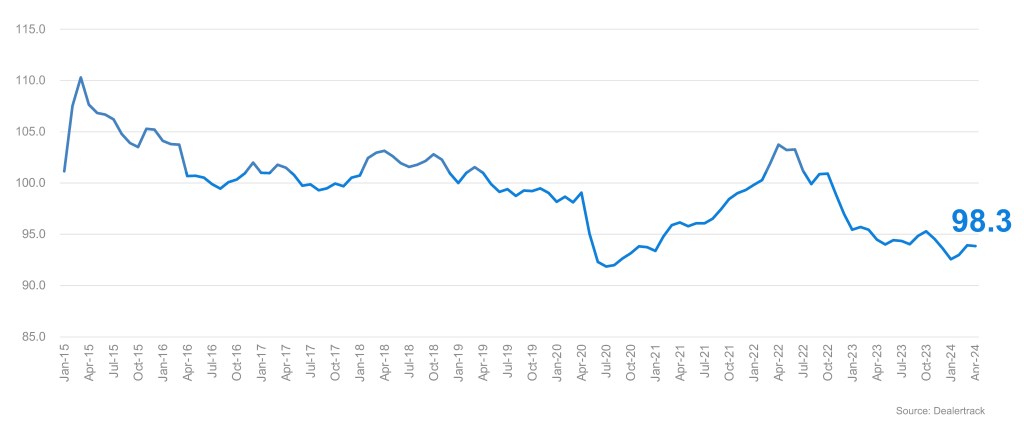Data Point
Auto Credit Availability Declined in April
Friday May 10, 2024
Access to auto credit declined slightly in April as credit tightened across new and certified pre-owned (CPO) channels and at banks and captives, according to the Dealertrack Credit Availability Index. The All-Loans Index declined to 93.8 in April, down 0.7% year over year. Credit access in April was tighter than a year ago in all channels except used sales through independent dealers and new sales. Credit access was more varied year over year by lender type, as credit unions and auto-focused finance companies were looser while banks were tighter, and captives were unchanged.
Dealertrack Credit Availability Index1
Auto loan access worsened slightly in April and was down year over year
All Auto Loans Index (Jan2019=100)

Most April Credit Availability Factors Moved Against Consumers
Credit availability factors mostly moved against consumers in April. Both approval rates and subprime share decreased. These moves reduced credit access for consumers. Yield spreads tightened, term lengths grew, down payments amount decreased, and the amount of negative equity in deals grew, which were all improvements for consumers. By channel, used loans through independent dealers saw the most loosening, while certified pre-owned loans saw the most tightening. On a year-over-year basis, channels were mixed, with used loans from independent dealers loosening while certified pre-owned loans saw the most tightening. Among lenders, auto-focused finance companies loosened the most in April, while banks tightened the most year over year.
The average yield spread on auto loans in April tightened by 46 basis points (BPs), so rates consumers saw on auto loans were more attractive in April relative to bond yields. The average auto loan rate decreased by 45 Basis Points (BPs) in April compared to March, while the 5-year U.S. Treasury increased by 1 BP, resulting in a wider average observed yield spread.
The approval rate decreased by 20 BPs in April and was down 2.4 percentage points year over year. The subprime share declined to 14.9% from 13.2% in April and was up 1.2% year over year.
The share of loans with greater than 72-month terms increased by 89 BPs and was down 1.0 percentage points year over year.
Sales channels saw mixed credit availability in April. Used loans through independent dealers saw the most loosening, while used certified pre-owned loans saw the most tightening. This is the first time in over a year that a sales channel has seen improvement year over year.
Credit Availability Was Mixed Across Lender Types in April
Credit availability was also mixed in April for lender types. Auto-focused finance companies saw the most loosening, while banks saw the most tightening. On a year-over-year basis, credit access was loosened the most for credit unions, while banks tightened the most.
Each Dealertrack Auto Credit Index tracks shifts in loan approval rates, subprime share, yield spreads and loan details, including term length, negative equity, and down payments. The index is baselined to January 2019 to show how credit access shifts over time.
Most Measures of Consumer Confidence Saw Declines in April
The Conference Board Consumer Confidence Index® declined 0.1% in April, as views of the present situation improved, but views of the future declined. Consumer confidence was up 0.7% year over year. Plans to purchase a vehicle in the next six months increased slightly but were flat year over year. According to the sentiment index from the University of Michigan, consumer sentiment declined 2.8% in April but was up 21.2% year over year. The median consumer expectation for inflation in a year jumped to 3.2%, its highest level since November, and the expectation for five years increased to 3.0%, which was also the highest since November. The consumer’s view of buying conditions for vehicles declined to the lowest level since December as views of interest rates and prices both deteriorated. The daily index of consumer sentiment from Morning Consult has been very volatile in April and has shown a 1.5% decline for the month as of Friday, leaving the index up 9.5% year over year. Gas prices have increased in April. The national average price for unleaded gas from AAA increased 3.5% from the end of March to $3.66 per gallon as of April 25, which was up 1% year over year.
The Dealertrack Credit Availability Index is a monthly index based on Dealertrack credit application data and will indicate whether access to auto loan credit is improving or worsening. The index will be published around the 10th of each month.
1In November 2023, the data behind the Dealertrack Auto Credit Availability Index was reset by our data sciences team as part of a migration to a new data management system. All points in the data set were reestablished, with January 2019 in the index set at 100 (as it had been previously). The All-Loans Index plot used in this post utilizes the new data set. The absolute numbers have shifted, but the trends and narrative have not. For more information, contact the Cox Automotive team.
Jonathan Gregory
Jonathan Gregory is a Senior Manager on Cox Automotive’s economic and industry insights team, which works to find actionable insights for the industry posed by Cox Automotive clients. Jonathan works with the Sales, Finance, and Data Science organizations and creates innovative solutions often combining proprietary data from other Cox Automotive brands. Jonathan joined Cox Automotive in 2022.

